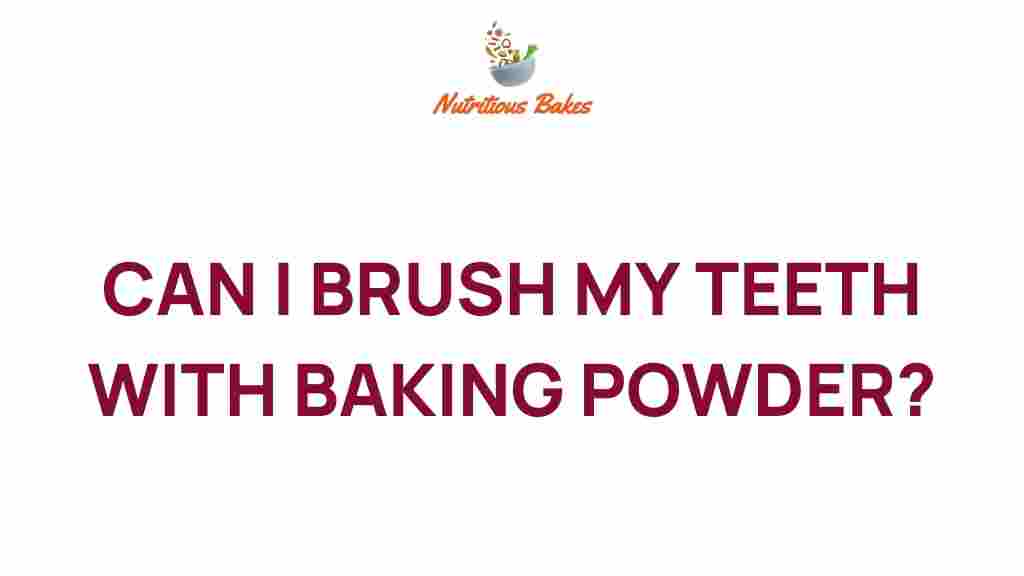The Surprising Truth: Can Baking Powder Replace Your Toothpaste?
The quest for optimal oral health has led many to explore various toothpaste alternatives. One of the most discussed options is baking powder. Known for its versatility in cooking and cleaning, baking powder has also made its way into the realm of dental care. But can this common kitchen staple effectively replace your traditional toothpaste? In this article, we’ll delve into the surprising truth about using baking powder for oral hygiene.
What is Baking Powder?
Baking powder is a leavening agent used in baking that consists of a combination of an acid, a base, and a filler. It helps baked goods rise by producing carbon dioxide gas when mixed with moisture and heat. While primarily known for its culinary uses, baking powder can also serve as a natural cleaning agent and, as we will explore, a potential component of your dental care routine.
Benefits of Using Baking Powder for Oral Health
There are several reasons why some people consider using baking powder as a toothpaste alternative:
- Teeth Whitening: Baking powder is mildly abrasive, which can help remove surface stains from teeth, contributing to a brighter smile.
- pH Neutralization: Baking powder can help neutralize acids in the mouth, reducing the risk of enamel erosion and cavities.
- Odor Neutralization: The alkaline properties of baking powder can help combat bad breath by neutralizing odor-causing bacteria.
- Cost-Effective: Using baking powder as a home remedy for dental care can be more economical than purchasing commercial toothpaste.
How to Use Baking Powder as a Toothpaste Alternative
If you’re interested in trying baking powder for your dental hygiene routine, here’s a simple step-by-step process:
Step 1: Gather Your Materials
You will need:
- 1 teaspoon of baking powder
- Water (to create a paste)
- A toothbrush
- (Optional) Essential oils for flavoring, such as peppermint or tea tree oil
Step 2: Create the Paste
In a small bowl, mix one teaspoon of baking powder with enough water to form a paste. If you prefer a minty taste, add a drop or two of your chosen essential oil. This will enhance the flavor and provide additional antimicrobial benefits.
Step 3: Brush Your Teeth
Use your toothbrush to apply the baking powder paste to your teeth. Brush gently, focusing on all surfaces of your teeth for about two minutes. Be sure to avoid excessive pressure to prevent damaging your enamel.
Step 4: Rinse Thoroughly
After brushing, rinse your mouth thoroughly with water to remove any residue. It’s advisable to follow up with a fluoride mouthwash for added protection against cavities.
Possible Side Effects of Using Baking Powder
While baking powder can have benefits for dental care, it’s essential to consider potential side effects:
- Enamel Erosion: The abrasiveness of baking powder can wear down enamel if used excessively. Limit its use to a few times a week.
- Gum Irritation: Some individuals may experience gum irritation or sensitivity. If you notice discomfort, discontinue use.
- Inadequate Fluoride: Baking powder does not contain fluoride, which is essential for preventing cavities. It’s crucial to balance its use with fluoride toothpaste or mouthwash.
Hygiene Tips for Optimal Oral Health
While baking powder can be a helpful toothpaste alternative, maintaining overall oral hygiene is vital. Here are some tips for optimal dental care:
- Brush your teeth at least twice a day with fluoride toothpaste.
- Floss daily to remove plaque and food particles between teeth.
- Visit your dentist regularly for check-ups and cleanings.
- Limit sugary snacks and beverages to reduce the risk of cavities.
- Stay hydrated, as water helps wash away food particles and bacteria.
Internal and External Resources
For further reading on maintaining oral health, you can explore more about the importance of fluoride in dental care by visiting this resource. Additionally, consider checking out various home remedies for dental care at this external site.
Troubleshooting Tips
If you decide to incorporate baking powder into your dental hygiene routine, here are some troubleshooting tips:
- Too Abrasive: If you feel that baking powder is too abrasive for your teeth, mix it with more water to create a thinner paste.
- Flavor Issues: If you dislike the taste, try different essential oils to find a flavor you enjoy.
- Gum Sensitivity: If you experience gum sensitivity, reduce the frequency of use or consult your dentist for advice.
Conclusion
The surprising truth is that baking powder can serve as a viable toothpaste alternative for some individuals when used thoughtfully. Its potential benefits for teeth whitening and pH neutralization make it an appealing option for those exploring natural dental care solutions. However, it’s essential to remember that baking powder should not completely replace your traditional toothpaste, especially one that contains fluoride. Achieving optimal oral health involves a balance of effective products and proper hygiene practices. Always listen to your body, and consult a dental professional if you have any concerns about your oral hygiene routine.
This article is in the category Tips and created by NutritiousBakes Team
